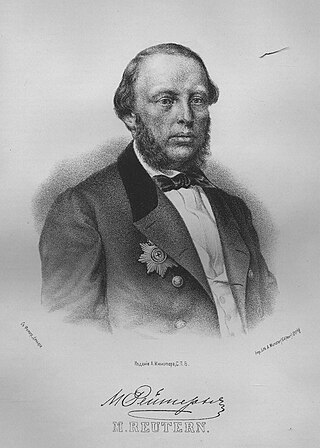Top Qs
Timeline
Chat
Perspective
Michael von Reutern
Russian finance minister (1820–1890) From Wikipedia, the free encyclopedia
Remove ads
Michael Graf[2] von Reutern (Russian: Михаил Христофорович Рейтерн, romanized: Mikhail Khristoforovich Reytern; 24 September [O.S. 12 September] 1820 – 23 August [O.S. 11 August] 1890) was a Russian statesman of Baltic German origin who served as the finance minister from 1862 to 1878.[3]

Remove ads
Life
Summarize
Perspective
Reutern was born on 24 September [O.S. 12 September] 1820 in Porechye of Smolensk Governorate in Russia. He came from the Baltic German noble family of Reutern; his father Christoph Adam von Reutern (1782–1833) was a lieutenant-general in the Imperial Russian Army and his mother Charlotte Elisabeth von Helffreich was a noblewoman. He was the nephew of the famous painter Gerhardt Wilhelm von Reutern. The Reuterns were of Holsteinish descent, originating in Lübeck. The family was originally called Reuter, they got their name when Johann Reuter (1635–1698), a merchant, was raised to in the Swedish nobility in 1691.
Reutern graduated from the Tsarskoye Selo Lyceum in 1837. He started his career as a civil servant in the ministry of finance in 1840; he was transferred to the Ministry of Justice in 1843, where he remained until 1854. In 1862, he was appointed finance minister under the liberal reformist tsar, Alexander II, and introduced a system of public accounting. Reutern's period in office was also marked by the promotion of private credit institutions and attempts to stabilise the ruble. He succeeded in reforming taxation and customs laws, by abolishing the spirits lease and the introduction of an excise tax on brandy. Government revenues rose significantly, the chronic budget deficit was removed in 1867, and budgetary surpluses were achieved from 1873. On trade policy, Reutern pragmatically supported reducing some tariffs and duties on manufacturing goods in 1863 and 1868.
The Russo-Turkish War reversed some of the measures that had led to Reutern's successes, and he resigned in 1878.
Remove ads
References
Sources
External links
Wikiwand - on
Seamless Wikipedia browsing. On steroids.
Remove ads

